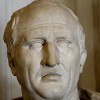“ for the man who acts unjustly has too much, and the man who is unjustly treated too little, of what is good. In the case of evil the reverse is true; for the lesser evil is reckoned a good in comparison with the greater evil, since the lesser evil is rather to be chosen than the greater, and what is worthy of choice is good, and what is worthier of choice a greater good. ”
Aristotle, Nicomachean Ethics (c. 334 BC - 330 BC). copy citation
| Author | Aristotle |
|---|---|
| Source | Nicomachean Ethics |
| Topic | comparison choice |
| Date | c. 334 BC - 330 BC |
| Language | English |
| Reference | |
| Note | Translated by W. D. Ross |
| Weblink | http://classics.mit.edu/Aristotle/nicomachaen.mb.txt |
Context
“for we cannot get a single term standing for a person and a thing.
This, then, is what the just is-the proportional; the unjust is what violates the proportion. Hence one term becomes too great, the other too small, as indeed happens in practice; for the man who acts unjustly has too much, and the man who is unjustly treated too little, of what is good. In the case of evil the reverse is true; for the lesser evil is reckoned a good in comparison with the greater evil, since the lesser evil is rather to be chosen than the greater, and what is worthy of choice is good, and what is worthier of choice a greater good.
This, then, is one species of the just.
4
(B) The remaining one is the rectificatory, which arises in connexion with transactions both voluntary and involuntary. This form of the just has a different specific character from the former.”
source



